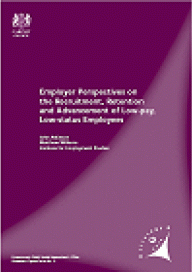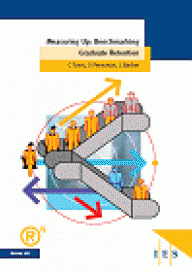Publications
 We author and publish a range of resources to keep you up to date with the latest developments in employment, labour market and human resource policy and practice.
We author and publish a range of resources to keep you up to date with the latest developments in employment, labour market and human resource policy and practice.
All our pdf publications are free to access.
Search results
-

Best Practice in Rehabilitating Employees Following Absence Due to Work-Related Stress
Thomson L, Rick J, Neathey F | Jun 2003 | Health and Safety ExecutiveThis report identifies specific examples of best practice following absence due to stress-related illness, and various factors that influence its effectiveness. It considers the historical development of any rehabilitation practices within the case study organisations, and describes the key factors influencing the development of procedures.
-

How Flexible is Total Reward?
Silverman M, Reilly P | Jun 2003 | Institute for Employment StudiesThis paper outlines the nature of total reward and flexible benefits. It describes how common such schemes are in the UK and sets out the reasons for introducing these remuneration initiatives. Common problems and obstacles are reviewed and some practical questions are looked at.
-

Minority Ethnic Students in Higher Education: interim report
Connor H, Tyers C, Davis S, Tackey N D, Modood T | Jun 2003 | Department for Education and SkillsThis report is about research on the flows into, through and out of higher education (HE) of minority ethnic groups. The focus is on undergraduate study in England, and presents interim findings of an initial assessment of existing research evidence on minority ethnic groups in HE, and a national survey of undergraduate students undertaken in Spring 2002. The survey explored their choices of HE study, experiences to date, financial issues and job/career plans.
-

Employer Perspectives on the Recruitment, Retention and Advancement of Low-pay, Low-status Employees
Atkinson J, Williams M | Jun 2003 | Cabinet OfficeLow skill, low status jobs in the UK can constitute a first step on a ladder to rising lifetime earnings, in which experience, tacit skills, contacts and know-how can be acquired and used to promote a pay off later. However, in practice, they provide little or no basis for substantial advancement through the labour market: the evidence suggests that short-term mobility in the wage distribution is limited, and that individuals who do progress, do not generally progress very far.
-

Measuring Up
Benchmarking Graduate Retention
Tyers C, Perryman S, Barber L | May 2003 | Institute for Employment StudiesRetention levels of new-graduate staff can vary amongst employers according to a number of factors. These include company size, industrial sector and the type of role on offer. Employers also vary in their level of commitment to monitoring retention, and in the range of methods used to retain graduates fresh out of university.
-
📄
Informing Choices
The Need for Career Advice in Medical Training
Jackson C, Ball JE, Hirsh W, Kidd JM | May 2003 | National Institute of Careers Education and CounsellingHow should the career support provided to doctors and medical students during their medical training be improved? Experience elsewhere suggests that unless such support is developed to meet the specific requirements of doctors and medical students, it is unlikely to achieve all its objectives. This research study set out to find out exactly what these requirements were and how best they might be catered for.
-

New Learners, New Learning
A strategic evaluation of Ufi
Tamkin P, Hillage J, Dewson S, Sinclair A | May 2003 | Department for Education and SkillsUniversity for Industry (Ufi) was launched in autumn 2000 as the government's flagship for lifelong learning, intending to make a reality from the vision of a 'university for industry'. Ufi delivers under the brand name learndirect. In 2002, the DfES commissioned IES to undertake an evaluation of Ufi's performance against its strategic objectives of improving individuals' employability and organisations' productivity and competitiveness.
-
📄
A Review of Current Research into Absence Management
Hill D, Hayday S | Apr 2003 | Institute for Employment StudiesThis paper reviews the most recent findings in absence statistics and attendance management. This will serve as a resource for researchers and HR managers attempting to understand what can be done to improve attendance management, and also to compare and contrast the various absence statistics among different business types, and job functions.
-

Chore to Champions
the making of better people managers
Tamkin P, Hirsh W, Tyers C | Apr 2003 | Institute for Employment StudiesThe issue of how managers deal with the 'people bit' of their jobs is one of the biggest challenges facing organisations and the managers who work for them. This report reviews how some organisations approach the improvement of people management skills, from the perspective of HR managers, line managers, employees and also some providers of management development services.
-
📄
The IES Annual Graduate Review, 2003 update
Business as usual? Trends in student and graduate numbers
Perryman S | Apr 2003 | Institute for Employment StudiesThe numbers of students flowing into higher education, and the numbers graduating, might have levelled off, but good educational and employment outcomes had accrued to the majority of HE participants in recent years. However, the prospects for the future cohorts of new graduates in 2003 did not appear to be as certain as they had been in recent years.
